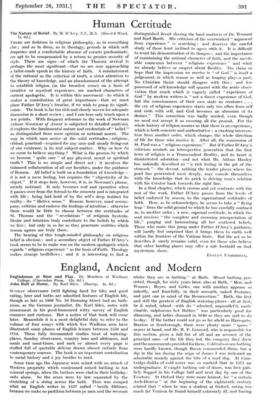Human Certitude
THERE are fashions in religious philosophy, as in everything else ; and as in dress, so in theology, periods in which soft draperies and a comfortable absence of corsets predominate, are apt to be compensated by a return to greater severity of style. There are signs---of which the Thomist revival is perhaps the most significant—that we are now approaching a tailor-made epoch in the history of faith. A reinstatement of the rational as the criterion of truth, a strict attention to the theory of knowledge, and an abandonment of the attempt to establish religion (in the broadest sense) on a basis of intuitive or mystical experience, are marked characters of current apologetic. It is within this movement—to which it makes a contribution of great importance—that we must place Father D'Arcy's treatise, if we wish to grasp its signifi- cance. The book is far too rich and closely woven for adequate discussion in a short review ; and I can here only touch upon a few points. With frequent reference to the work of Newman (whose Grammar of Assent is subjected to detailed analysis), it explores the fundamental nature and credentials of "
as distinguished from mere opinion or notional assent. The way in which men arrive at the solid certitudes—religious., ethical, practical—required for any sane and steady living-out of our existence, is its real subject-matter. Why or how do we come to believe anything ? What is the process by which we become " quite sure " of any physical, moral or spiritual truth ? This is no simple and direct act ; it involves the balanced collaboration of all our faculties, under the guidance of Reason. All belief is built on a foundation of knowledge— it is not a mere feeling, but requires the " objectivity of its object." If it stops here, however, it is, in Newman's phrase, merely notional. It only becomes real and operative when it passes over from the formal to the concrete and is integrated with life : being laid hold of by the self's deep instinct for reality—its " illative sense." Reason, however, must accom- pany, criticize and endorse the findings of intuition : otherwise there would be little to choose between the certitudes of St. Thomas and the " revelations " of religious hysteria. Desire and intuition truly contribute to the beliefs by which we live ; but only in so far as they penetrate realities which reason agrees are truly there.
The bearing of this tough-minded philosophy on religious belief is obvious ; and a secondary object of Father D'Arcy's book seems to be to make war on the modern apologetic which regards " religious experience " as the basis of Faith. Theology makes strange bedfellow's ; and it is interesting to find a distinguished Jesuit sharing the hard mattress of Dr. Tennant and Karl Barth. His criticism of the overworked argument from experience " is searching ; and deserves the careful study of those least inclined to agree with it. It is difficult to resist his demonstration of its dangers ; and the importance of maintaining the rational character of faith, and the inevit- able connexion between " religious experience " and what we already believe or suspect about Reality. The claim or hope that the impression we receive is " of God " is itself a judgement, in which reason as well as longing plays a part. No Christian theist should disagree with this ; and few possessed of self-knowledge will quarrel with the acute obser- vation that much which is vaguely called " experience of God " by modern writers is " not a direct experience of God, but the consciousness of their own state as creatures . . . the cry of religious experience starts only too often from self and ends with self, and God becomes an almsman of its desires." This correction was badly needed, even though we need not accept it as covering all the ground. For the whole history of religion assures us that there is an experience, which is both concrete and authoritative ; a crashing interven- tion from another order, which changes the whole direction of life for those who receive it. After all, the conversion of St. Paul was a " religious experience." But if Father D'Arcy's criticism reminds an introspective generation that the first term of religion is a Transcendent Reality, and its heart is disinterested adoration—and not what Mr. Aldous Huxley has unkindly described as " a rich feeling in the pit of the stomach "—the devout, rubbing the tender places where his goad has penetrated most deeply, may console themselves with the knowledge that its prick is driving man's relation with his Creator back towards the right line.
In a final chapter, which crowns and yet contrasts with the rest of the work, Father D'Arey passes from the levels of belief endorsed by reason, to the supernatural certitudes of faith. Here, as he acknowledges, he seems to take a " flying leap " from the solid ground to which he has carefully confined us, to another order ; a new, supernal certitude, in which the soul receives " the complete and crowning interpretation of life," purging and harmonizing all her scattered beliefs. Those who make this jump under Father D'Arcy's guidance, will hardly feel surprised that it brings them to earth well within the frontiers of the Vatican State. But the act as he describes it surely remains valid, even for those who believe that other landing places may offer a safe foothold on that mysterious shore.
EVEI.YN UNDERHILL.


































 Previous page
Previous page